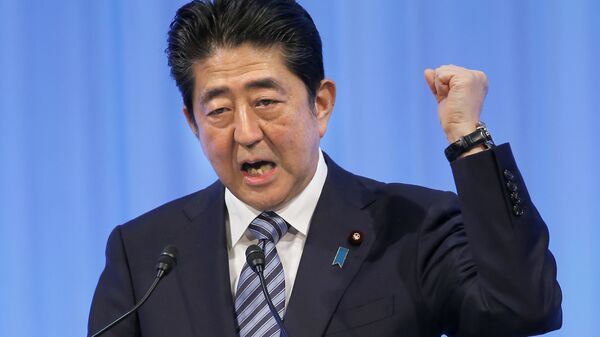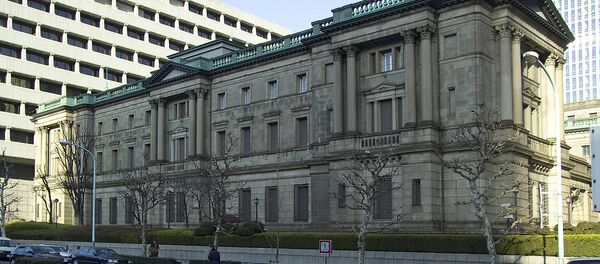Kristian Rouz — Japanese Prime Minister Shinzo Abe has apologized in the ongoing scandal surrounding his alleged approval of a sale of public land at a fraction of its market value. This comes as his approval ratings tanked in two separate polls. Meanwhile, Japan's Finance Ministry is denying Abe's complicity in the questionable deal.
On Monday, PM Abe answered questions in the Parliament concerning the deal, in which he allegedly gave regulatory approval to the unprofitable sale of land to a school management company with ties to his wife.
"This problem has shaken the people's confidence in the administration," Abe said. "As head of the government, I keenly feel my responsibility and would like to deeply apologize to the people."
The scandal has been brewing for weeks, and most recently, an Asahi News Network poll has shown Abe's approval rating decline by 11.7 percent to just 32.6 — meantime, his disapproval rose 13.2 percent to 54.9 percent.
A separate poll from the well-respected Nikkei newspaper has revealed Abe's popularity dropped to 42 percent, whilst his disapproval rating was 49 percent.
READ MORE: South Korean Ex-President Faces Interrogation Over Corruption Charges — Reports
This comes despite the Abe cabinet's recent success reviving the Japanese economy after decades of stagnation and zero inflation, supported by a robust increase in wages, stock market gains, and an acceleration in economic activity.
PM Abe is also being accused of attempting to cover up the details of the deal. Finance Minister Taro Aso is now facing a mounting pressure to resign. However, a high-ranking Finance Ministry official said in his testimony to the Parliament that neither the Prime Minister nor the Finance Minister was involved in altering the document to advance the deal.
On Tuesday, former Finance Ministry official Nobuhisa Sagawa is set to testify before Parliament. Sagawa oversaw the deal during his tenure in the government.
The scandal comes at a very inopportune moment for the Abe cabinet. Japan is preparing for the crucial talks with North Korea, whilst Abe himself — who won his third term in last year's election in a landslide — is aiming to re-write the Japanese Constitution.
The constitution was drafted by the US occupation forces after the fall of the Japanese Empire back in 1945. Now PM Abe is seeking to abolish the pacifist clause in Japan's main law, allowing the use of the nation's military for purposes other than fully-justified self-defense.
"The time has finally come to tackle constitutional revision, which has been a task since the founding of the party," Abe said also on Monday. "Let's stipulate the Self-Defense Forces and put an end to a controversy about violation of the Constitution."
However, his interview in the Parliament was followed by a street rally in Tokyo. The protesters carried banners that read "Go to jail Abe" and "No constitutional revision or war."
"We're protesting to defeat Abe's government through our voices and the anger of the people," the 69-year-old protester in Tokyo, Fumiko Katsuragi, said.
This comes as Japan is feeling increasingly exposed in the face of recent developments in North Korea's nuclear and ballistic missile programs. On the other hand, the Japanese public has been increasingly anxious about nuclear-related matters — particularly so after the 2011 Fukushima incident.
Additionally, his declining popular support could prevent Abe from being re-elected as the leader of the ruling Liberal-Democratic Party (LDP). Abe is planning to win the third term as LDP leader in a September vote.
READ MORE: Police Interrogate Israeli PM Netanyahu and His Wife Over Corruption Charges
The nuclear and military issues are very controversial and divisive within Japanese society, and the outrage over Abe's alleged corruption might hinder the LDP's effort to advance constitutional change. This, in turn, could hamper Japan's ability to undertake an effective military response to an external threat.
Additionally, Japan — along with South Korea — are coming to the negotiating table with North Korea weakened by internal turmoil and mutual accusations surrounding the so-called "comfort women" from World War II.
However, Abe is still full of optimism, capitalizing on the robust economic expansion in his country. He said he is hoping to resolve the corruption allegations and to win back popular support. Meanwhile, the LDP does not always appoint its premier based on popular opinion, as the party leader is elected exclusively by LDP members.




